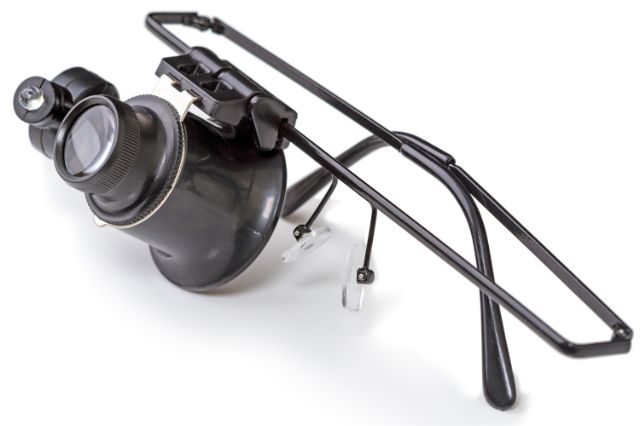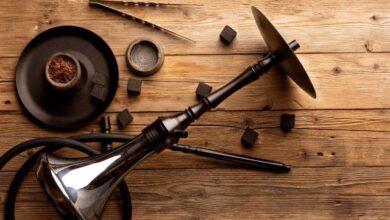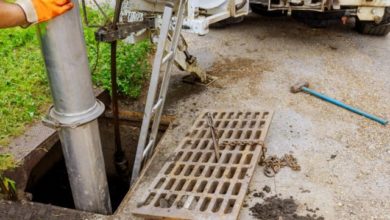New to Beekeeping? Here are the Different Glasses You Might Need

Beekeeping is becoming increasingly popular as a hobby in the US, with more people interested in the pursuit out of a desire to help declining bee populations. Beekeeping offers many benefits: as well as being great for the environment (by promoting plenty of pollination), it’s a relatively inexpensive hobby and provides a regular supply of delicious honey.
Protective clothing is vital when beekeeping. As well as the coveralls, hat, and veil that we imagine when we think of beekeepers, protective beekeeper glasses or magnifying glasses are also likely to be a crucial element of your equipment.
Beekeeper Magnifier Glasses
Beekeepers need to keep their hands free when inspecting the inside of a hive, grafting larvae, or doing many other tasks. Magnifying glasses are a great tool for beekeepers – ideally, look for ones that also act as a torch, with an adjustable lamp brightness and various magnification settings, so you don’t miss a thing.
Most magnifier glasses feature a pivot on the headband, so you can easily tilt the visor out of the way when it’s not needed, and an adjustable headband, allowing you to achieve the best, most secure fit possible.
Safety Glasses for Beekeepers
It’s important that beekeepers protect their eyes from the foam droplets and dust that’s an inherent part of the job, and a pair of safety glasses designed especially for beekeepers is, therefore, a vital piece of kit.
When choosing this type of eyewear, look for an option that also provides protection from UV light, has a high-quality hinge for durability, and is as comfortable to wear as possible.
Helmet with Veil
And for complete protection for the eyes and face, many beekeepers opt for a full beekeeper suit that incorporates a helmet (or hat) and veil. The tight weave mesh keeps dust and debris (and bees!) away from the eyes but is breathable, too.
What if I Need Prescription Glasses?
If you wear prescription glasses, you have a couple of options. Many high-quality safety glasses and goggles can be fitted with corrective lenses, even for those with particularly high prescriptions or who need progressive lenses. Alternatively, some beekeepers’ glasses or safety goggles can be worn over regular eyeglasses so you get the protection you need.
Finally, you may wish to look into ‘enhanced’ reading glasses, which offer stronger magnification in the reading area of the lens. This can be great for the kind of close work, such as looking for eggs and grafting, that beekeeping requires.
Speak with your ophthalmologist or eye doctor for more information on whether corrective lenses are compatible with the particular eyewear you have in mind.
Tips for New Beekeepers
If you’re new to the beekeeping game, ensuring your protective clothes are adequate is a must. As well as the eyes, the rest of the body should be properly protected from bee stings – which can be especially dangerous to the head.
There are plenty of other tips, too, to help you get up and running successfully as a new beekeeper:
- Join a local beekeeping group or association to learn more and discover some of the tricks of the trade
- Choose the breed of bee that best suits your local climate and beekeeping style
- Place the hive on a level spot that enjoys plenty of sunshine
- Install a water dispenser and feeder near the hive
- Bees should be checked on regularly: spotting little problems early means you can address them before they turn into big problems
- Malnourished bees can be treated with sugar syrup or a pollen supplement
Avoiding Stings
Prevention is better than cure, so as well as being sure to wear the right protective equipment, use these tips to help avoid stings from your hive’s residents:
- Be calm: don’t swat at the bees, avoid dropping the frames, and move slowly and intentionally
- Reduce strong odors: honey bees are very sensitive to smell, and might be triggered by, for example, the scent of strong perfume or cologne
- Avoid inspecting hives at night, when it’s raining, and during thunderstorms
- Don’t stay in front of the hive; avoiding remaining in the takeoff zone can help reduce the risk of stings
- Let the bees get to know you; familiarity means you’re also less likely to suffer a sting
Best Glasses for Beekeepers: The Takeaway
As a beekeeper, personal safety gear is the most important piece of equipment of all, and protective glasses are an important part of your setup. Use the guide above to get the eyewear that’s right for you so that you can best enjoy your beekeeping endeavors, without the risk of a nasty sting.



